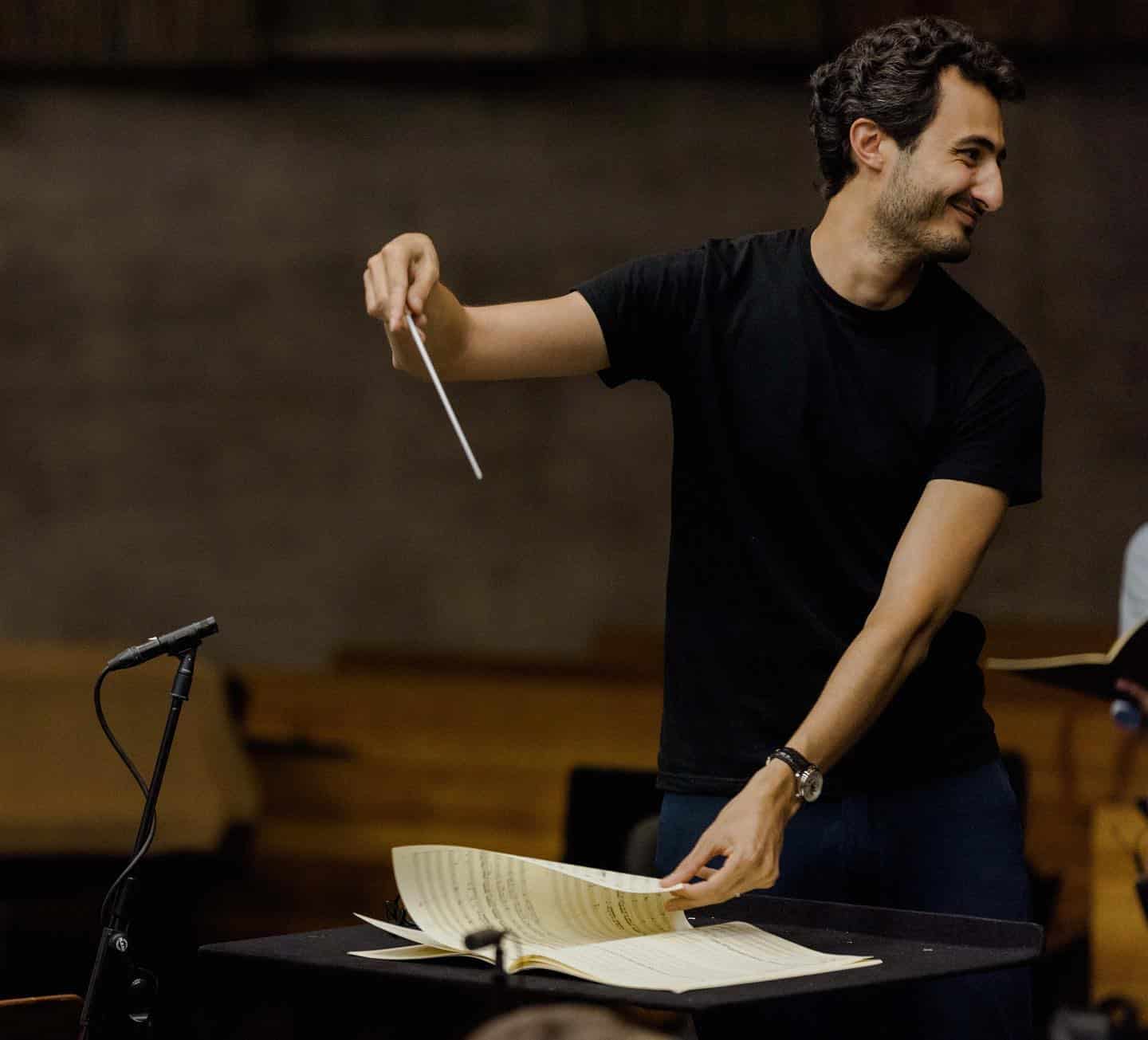The opposite to Karajan in Mahler 9th
mainMy album of the week on sinfinimusic.com is a new interpretation of Mahler’s ninth symphony that dares to go against the grain of grand maestro gestures in this deeply troubling work.
Objective, dry and slightly detached, this is an immersive Ninth, played with moments of dazzling zest and courage (the soloists should really be named in the booklet) and rising to an altogether credible, entirely open conclusion.
Since the conductor is an outside candidate at today’s Berlin Philharmonic election, I’d better not mention his name for fear of being arrested by the thought police and charged with abusing due process. But you can read it here.






On the other hand, if you need to explore a totally “non-karajanic” approach of this work (whatever that means), where sheer beauty of sound and the tragic sense of farewell is not the essence, but where musical clarity and structural logic comes first letting the music evolve undisturbed, then try Klemperer. Or Gielen, or Boulez…
For beauty of orchestral expression and highly charged emotion, Barbirolli’s recording with the BPO is this listeners top favorite version. 😀
Mr X can be heard regularly in Berlin with the Konzerthausorchester, so listeners who would not agree with the BPO’s final choice can get compensation not far away.
There is also a beautiful recording of Mahler IX by Libor Pesek and the Liverpool Phil.
Mahler’s ‘death obsession’ was a constant factor in his music from opus 1 onwards (Das klagende Lied).
I’ve just been thinking about objective renditions of orchestral pieces that challenge grand maestro tendencies. I’m wondering if this kind of objectivity in this recording and, for instance, in historically sensitive Beethoven might be written off as “charlatan” and “vacant”. Might this objective approach to the repertoire be seen as having style and lacking substance, even if it adheres scrupulously to the composer’s wishes?
If a composer’s process is to put on paper what they hear in their head – if the conductor follows that and stays out of the way, something could be communicated that even the composer has little understanding of, but is just a transmitter (perhaps Wagner and Bruckner). Of course, not all composers have that process – the music could be “mathematically” figured out and could mean nothing. However, different orchestras with different players and halls add some variation to how (at the very least) the effects are to be handled in order to achieve what the composer was (probably) going for.
In other words, good conductors stay out of the way while remaining completely involved.
All this sounds as an ‘objective’ approach to the score. Boulez would be the obvious example – as a conductor, that is. But a score can only come to life if a conductor, and under his leaderschip and inspiration: the players, infuse their subjectivity into the playing. So, the notes in themselves are not the piece. For instance, the very slight fluctuations in tempo, so important for any musical effect, can ony be realized convincingly in a subjective way. That is why Bernstein (in spite of his vulgarity), Karajan (in spite of his teutonic show), Beecham (in spite of his superficiality), Furtwängler (in spite of his lack of technique) were great conductors: they absorbed the score, made it their own, and tried through their very subjectivity to reach what they sensed was the essence of what the composer wanted to ‘say’. They tried to reach ‘objectivity’ through their ‘subjectivity’.
Karajan’s M9 is an overrated record IMO, Rattle’s rendition with the same orchestra is much better. “Objective, dry and slightly” detached may be applied also to Gary Bertini’s 9th with Cologne Philharmonic on EMI box set . Bertini was able to draw out Mahler’s innate emotions without being over the top or hysterical.
There is no orchestra named “Cologne Philharmonic” (or the equivalent on German). Maybe before you pontificate about the “innate emotions” in performances of Mahler’s music, you should try to get such basic and mundane things as who is actually performing right first? Just a thought.
I’ve often wondered what draws people to take the time to post snooty remarks when a fellow enthusiast has simply expressed a personal opinion, no matter how imperfectly framed it might be. I’m sure Mr. Schaffer has never made such mistakes, which allows him to display his superiority to one and all. What I’m not sure about, however, is how misconstruing the name of an orchestra that is customarily written in a foreign language has anything to do with his reaction to its performances. Still, if would be really nice if we could just disagree without becoming disagreeable – especially since the number of us who really care about many of the topics brought up in these pages is getting smaller and smaller all the time.
That said, I have to agree with Mr. Schaffer’s opinions below about Ivan Fischer’s recordings with the Budapest Festival Orchestra. I haven’t heard his Mahler yet, but I look forward to looking into it. I haven’t heard Bertini’s Mahler either, but I know his work going back to the 1960s and think he’s terribly underrated – at least in the U.S. He was a wonderful conductor and musician.
The difference is that Mr Schaffer usually makes it quite clear where his opinions are primarily personal, subjective reactions and where they are less subjective assessments – there are parameters of music making which can be assessed with a certain degree of “exactness”. There is no real “objectivity” in any of that, of course, but when it comes to some aspects of music making, e.g. the technical quality of the playing, assessing that is much less subjective, if one knows the standards of orchestral playing well.
However, someone who delivers pompous verdicts like Mr Mishugina but then doesn’t even know what one of the orchestras he talks about is called does not instill confidence in the quality of his judgments.
Hope that helps answering your questions!
And a tip for you, Mr P – if people babble about this or that being “overrated”, that’s usually because they don’t have a wide enough horizon to grasp why certain performances are very highly rated by others. I think that being very critical does not necessarily mean shooting down artistic performances that one doesn’t immediately grasp or connect with, but being able to see the good elements in a variety of artistic approaches.
And another tip, if you want to “agree without being disagreeable”, and you wonder why some people “take the time to post snooty remarks when a fellow enthusiast has simply expressed a personal opinion” – then don’t do the same thing and accept my personal opinion that that other guy really has no clue without derogatory remarks (“snooty”) of your own. Demonstrate how to “disagree without being disagreeable”. If you think I am a bad example, then be a good example, not the same kind of bad example yourself!
Huh?
Its Cologne radio symphony orchestra my bad. Thanks Dan.
I bet you’re fun at parties.
Wait a second; are you fellas inplying that Karajan didn’t follow the scores indications?
I’m not surprised to learn the identity of the conductor on the new Mahler 9th recording. He has excellent musical instincts, far above what most of the current crop of conductors are offering. Strange to say, in my experience, in rehearsals it was often difficult to grasp what he was trying to achieve, but his concerts could be incredibly focused and alive. I would welcome the chance to perform for him again.
I am a big fan of Fischer’s work with the Budapest Festival Orchestra. I have many of their recordings, including all their Mahler ones to date (1,2,4,5,6) and I find them all highly interesting. Musically very much to the point and very explicit. It is hard to define what exactly “idiomatic” means in music, but these are certainly very stylish and “idiomatic” performances. Their recording of Liszt’s Faust-Sinfonie is really outstanding, too.
That said, Karajan’s two versions of the Mahler 9 are exceptionally good in his own way, too, especially the later one, recorded live at the Berliner Festwochen in 1982. Probably one of the best things he did (certainly among those recordings that I have heard).
I don’t see any need to make Fischer an “anti-Karajan”. His work can certainly stand on its merits, and it’s great that we have such a wide spectrum of interpretations for music as complex as Mahler’s. Nor do I think that Fischer’s “reflectiveness and honesty” have anything to do with the fact that he is not a prime candidate for the principal conductor post with Karajan’s old orchestra.
Mahler said that music only begins with the notes. That counts a Boulez rendition out.
Mahler said that music only begins with the notes. That leaves a Boulez rendition out.
Only for superficial listeners. While it is generally true that Boulez is one of those conductors who do not like to add histrionic effects to their interpretations, he certainly does much more than have the orchestra “just play the notes”, adjust balances and clarify textures etc, all the things that are the first steps taken by any conductor who has a solid grasp of his craft. Boulez’ own compositions show that he is very interested in myriad nuances of sound, texture, rhythm etc, and many of his interpretations of other composers’ music show a similar interest in and attention to fine detail and in what makes the score a coherent musical work, not just a collection of notes.
So his interpretations are often at least interesting and equally often also quite revealing to listen to. And they are not generally as distanced and “cool” as some people say who seem to pay more attention to how interesting the conductor’s podium choreography looks than to what one can actually hear.
Plus, it’s not just Boulez who has input into the final result. The many highly experienced musicians in the orchestras he works with also have a lot to contribute, and that is very evident in his whole Mahler series.
That said, his recording of Mahler 9 with the CSO from that series is not one which appeals to me all that much on an emotional level, as interesting as it is to listen to. But that is my personal reaction, and it is not the same for the whole series. I find the performances of 2,3, 5, and 6 in the cycle highly engaging, and that may also have to do with the very stylish and colorful playing of the WPh.